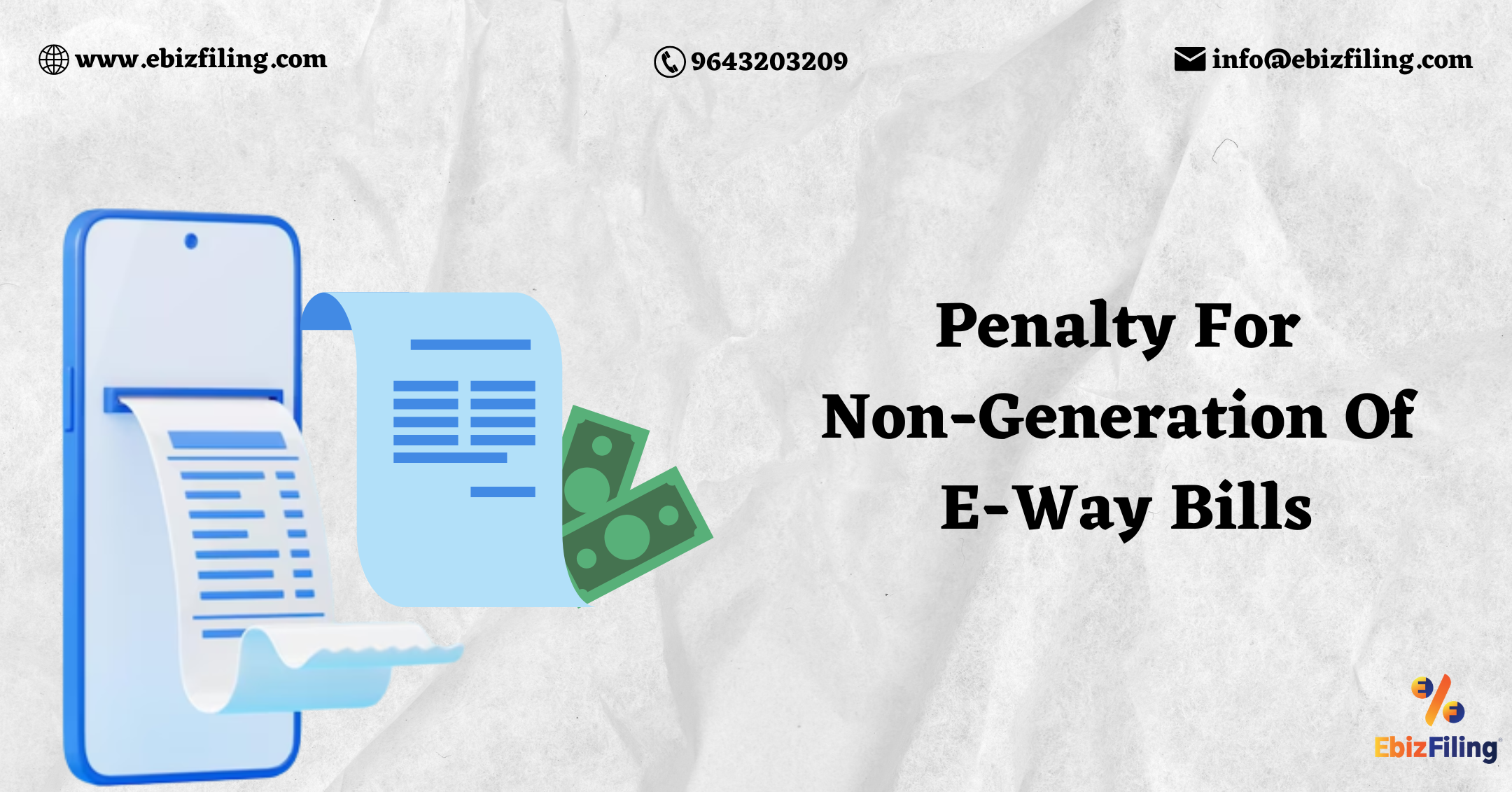
-
March 20, 2023
Penalty For Non-Generation Of E-Way Bills
Introduction
In India, the implementation of the Goods and Services Tax (GST) has brought about several changes in the taxation system. One of the significant changes introduced is the introduction of the E-Way Bill, which is an electronic document required for the transportation of goods worth more than Rs. 50,000. The E-Way Bill under GST aims to ensure that there is proper documentation of goods being transported across the country. Failure to generate an E-Way Bill can lead to severe penalties for businesses.
Penalty for Non-Generation of E-Way Bills
The government has made it mandatory for businesses to generate E-Way Bills for the transportation of goods. Failure to comply with this requirement can result in severe penalties. The penalty for non-generation of E-Way Bills under GST can be levied in two ways- one is for non-generation of E-Way Bills, and the other is for generating incorrect E-Way Bills.
If a business fails to generate an E-Way Bill under GST, it will be liable to pay a penalty equivalent to 200% of the tax amount or the value of the goods, whichever is higher. The minimum penalty that can be levied is Rs. 10,000. Therefore, if a business fails to generate an E-Way Bill for goods worth Rs. 50,000, it will have to pay a minimum penalty of Rs. 10,000. However, if the tax amount on the goods is more than Rs. 10,000, the penalty amount will be 200% of the tax amount.
Penalty for Generating Incorrect E-Way Bills
Apart from the penalty for non-generation of E-Way Bills, a penalty can also be levied for generating incorrect E-Way Bills. If a business generates an incorrect E-Way Bill, it will be liable to pay a penalty equivalent to 50% of the tax amount or the value of the goods, whichever is higher. The minimum penalty that can be levied is Rs. 10,000. Therefore, businesses must ensure that the information entered in the E-Way Bill is accurate and complete.
Time Limit for Generating E-Way Bills
Businesses must generate E-Way Bills before the transportation of goods commences. The validity of the E-Way Bill varies based on the distance travelled by the goods. For instance, an E-Way Bill for goods transported up to 100 km is valid for one day, while an E-Way Bill for goods transported between 100 and 300 km is valid for three days. Similarly, the validity of the E-Way Bill increases based on the distance travelled. Therefore, businesses must ensure that they generate E-Way Bills within the stipulated time limit.
Consequences of Non-Generation of E-Way Bills
The government has made it mandatory for businesses to generate E-Way Bills for the transportation of goods. Failure to comply with this requirement can result in severe consequences, such as detention of the goods and the vehicle carrying the goods. The detention of goods can lead to delays in the delivery of goods and can also result in additional costs for the business. Therefore, businesses must ensure that they comply with the E-Way Bill requirements to avoid such consequences.
Corrections to E-Way Bills
In case businesses make any errors while generating E-Way Bills, they can make corrections to the E-Way Bill under GST. However, businesses must make corrections within a certain time frame. If businesses fail to make corrections within the stipulated time, they will be liable to pay penalties for generating incorrect E-Way Bills.
Exceptions to E-Way Bill Requirements
There are certain exceptions to the E-Way Bill requirements. For instance, E-Way Bills are not required for the transportation of goods by non-motorized conveyance or for goods transported within a radius of 10 km from the place of business of the consignor or consignee. Similarly, E-Way Bills are not required for the transportation of certain goods, such as fruits, vegetables, and flowers.
Conclusion
The implementation of the E-Way Bill has brought about a significant change in the transportation of goods across the country. It has made it easier for the government to track the movement of goods and ensure that businesses comply with the tax laws. However, failure to generate E-Way Bills or generating incorrect E-Way Bills can lead to severe penalties. Therefore, businesses must ensure that they comply with the requirements of the E-Way Bill and generate accurate E-Way Bills. This will not only help them avoid penalties but also help them maintain their reputation in the market.
Interesting Read – FAQ’s on Blocking and unblocking of E-way Bills
File Your GST Return
File error-free GST Return and in-time. Get your GST return filings done through experts ebizfiling.com.
About Ebizfiling -










Reviews
Dev Desai
19 Nov 2021Loves their services
Harshit Gamit
19 Apr 2018My GST process was made easier with Ebizfiling. I really appreciate the hard work by your team. Keep up the same in the future. Good Luck!
Manank Turakhia
14 Jun 2019Ebizfilling.com is one of its kind of organization, believe me guys their working process is very smooth. I had an awesome experience regarding MSME certification. Thank you Kushani & Mansi for your wonderful efforts. Kudos to Ebizfiling, you are doing great keep doing it.
January 2, 2026 By Dhruvi D
Why TRPs should collaborate with ROC & legal experts? It Often Starts With a Filing That Doesn’t Feel Right Most Tax Return Preparers and GST Practitioners begin their day with numbers. Returns, reconciliations, GST filings, income details. That is the […]
January 1, 2026 By Dhruvi D
Skills GST practitioners should upgrade to in 2026 To begin, For a long time, being good with GST meant knowing returns, rates, and deadlines. If filings were accurate and timely, clients were satisfied. That definition is changing. In […]
January 1, 2026 By Dhruvi D
Best compliance add-ons for GST practitioners this Year It Usually Starts When GST Work Becomes Too Much to Handle Alone Most GST practitioners start their practice with a clear focus. File returns correctly. Meet deadlines. Handle notices when they come. […]